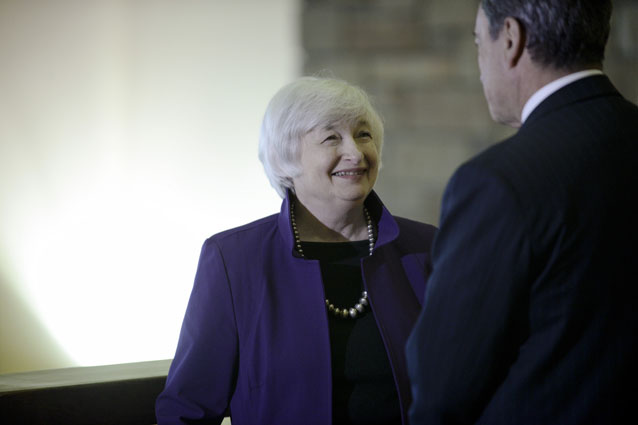Personal Wealth Management / Market Analysis
Words, Words, Words
Don't waste your time overthinking Fed forward guidance-it is merely marketing spin.
Janet Yellen shares a moment with ECB chief Mario Draghi at last month's banker powwow in Jackson Hole. (Not pictured: The red pen Yellen might use to make some edits to the Fed's policy statement.) Photo by Bradly Boner/Bloomberg via Getty Images.
So said Hamlet to Polonius in Act II, Scene 2, when asked what he was reading as he wandered the castle halls with his nose buried in parchment. We've always felt the same way about the forward guidance in the Fed's meeting statements-the Fed's supposed attempt at previewing future moves. They aren't policy promises or prophesies. They're just a bunch of words written in a language called Fedspeak, deliberately fuzzy so they don't back the Fed into a corner. So we're a wee bit puzzled by the punditry's handwringing over the mere possibility of the Fed removing the words "considerable time" from its meeting statement this week. As in, changing the sentence saying, "The Committee continues to anticipate, based on its assessment of these factors, that it likely will be appropriate to maintain the current target range for the federal funds rate for a considerable time after the asset purchase program ends ..." Whether or not those two words go bye-bye, it says nothing about when rates actually will rise.
Just consider how we got here in the first place. From December 2012 through January 2014, the Fed's statement said this: "The Committee continues to anticipate, based on its assessment of these factors, that it likely will be appropriate to maintain the current target range for the federal funds rate well past the time that the unemployment rate declines below 6-1/2 percent, especially if projected inflation continues to run below the Committee's 2 percent longer-run goal."[i]
But by March's meeting-Janet Yellen's first as Fed head-unemployment was down to 6.7% (February's initial reading, which was the most recent data at the time), and keeping the 6.5% target might have implied a hike was imminent, which some people don't like. So they made some edits, saying rates would stay low for a while after quantitative easing ends. When asked to clarify what that meant, Yellen said: "So, I-you know, this is the kind of term-it's hard to define. But, you know, it probably means something on the order of around six months or that type of thing. But, you know, it depends."[ii]
This language and interpretation have remained ever since. Yet now their future is uncertain. Philly Fed President Charles Plosser dissented at July's meeting, saying the "considerable time" language was too "time dependent and does not reflect the considerable economic progress that has been made toward the Committee's goals." Earlier this month, two regional Federal Reserve bank presidents (including one on this year's voting committee) implied they agreed. And then the media went into overdrive, wondering if a "language tantrum" would erupt over the removal of "the only two words that will matter." We think that translates as, will markets tumble if the Fed makes some edits?
We also think that's the wrong question. One, it is way too short term-it focuses on the market's reaction to words, not actions, and it focuses on a brief window of time. Two, it assumes the Fed's goal here is to actually communicate future plans. But this generally isn't true. If Ben Bernanke and Alan Greenspan are any sort of precedent, the goal is to give the illusion of revealing plans without saying anything at all. A sort of "hey, don't worry, we're on this!" so investors can be confident the Fed isn't asleep at the wheel-without actually saying they'll do anything.[iii] The Fed's own historical records have plenty of evidence the goal is obfuscation, not clarity.
To see this in action, we travel back to six years ago this very day: September 16, 2008, when the Bernanke Fed was crafting its policy statement just after Lehman went under. At issue: Whether to add "closely" to the sentence saying, "The Committee will continue to monitor economic and financial developments and will act as needed to promote sustainable economic growth and price stability." Here are some excerpts of the debate over that one adverb. You can read the full thing here, pages 78 to 85.
MR. EVANS: What type of reaction do we think will be engendered by inserting "closely"? Everybody understands that we monitor financial developments very carefully. So we are bringing attention to this. Will there be a presumption that we are likely to do something intermeeting or something like that? ...
MR. LACKER: I echo President Evans's concern. My recollection is-and I haven't consulted the record recently-under your predecessor there was some phrasing like "watch market developments closely" that came to be widely understood as a signal of an intermeeting move. ...
MR. KROSZNER: ... By including "closely," I think the markets are going to look very closely at that change, and they are going to think that we are clearly trying to convey something with that. ... Just as at one point we used the word "yet," and that got an enormous amount of attention. And this has two syllables. [Laughter]"
MR. FISHER: Unless you are from the south. [Laughter]
CHAIRMAN BERNANKE: The sad thing is that Governor Kroszner is right. We have seventeen people debating over this word, and it actually does matter.
MR. WARSH: Let me ask Brian and Bill. Brian, without "closely," how do you think the markets will react to that?
MR. MADIGAN: That you are not particularly ready to change your stance of policy.
MR. DUDLEY: I think the expectation going in is, for most people, that you are not prepared to ease today, but if things got really dark from here you would. So the question is, How do you convey that with the right word? You need something between "closely" and-
MR. WARSH: I think the sentiment we are trying to suggest is watchful waiting. We are not indifferent, we are not clueless, we are paying attention, but we are not predisposed.
MR. KOHN: My suggestion was to substitute "carefully" for "closely." I agree that "monitor closely" had this other connotation, but I think we should be seen as paying more attention than usual. ...
MR. DUDLEY: "The Committee will carefully evaluate economic and financial market developments." That means you are on the case.
CHAIRMAN BERNANKE: Well, it is not an analytical thing we are doing. We are just watching closely.
MR. WARSH: Keenly? Carefully?
MR. LACKER: Including "closely," what does that imply about the opposite? I mean, are we going to be able to take that out?
MR. WARSH: Well, we have done things like "in a timely manner" and other kinds of phraseology.
MR. LACKER: Yes, but this is an adjective.
CHAIRMAN BERNANKE: No, it's an adverb.
MR. LACKER: There goes my credibility. [Laughter] ...
MR. WARSH: Mr. Chairman, I would support "carefully."
MR. EVANS: Just to be clear, we have gone a long way just now from its being a semantic discussion to whether or not the Committee wants to hint at the possibility of a near-term action. ...
CHAIRMAN BERNANKE: ... We don't want the world to feel that we are not awake, that we are not paying attention. We know that very unusual things are going on in the financial markets; and we are prepared, maybe not through monetary policy but through whatever mechanism is necessary, to address that. ...
MR. PLOSSER: ... I am a little concerned about what moving back "closely" means. Another alternative that I'll throw out would be, rather than use "closely," to say that "the Committee will continue to monitor economic and financial developments."
SEVERAL: That's what it said last time.
MR. PLOSSER: Well, that seems fine. We are monitoring these things. Is this the FOMC statement dictionary we are going to? Is this the code book? [Laughter]
CHAIRMAN BERNANKE: ... Let me just ask for a straw vote: "closely," no "closely," or "carefully." Do we want "carefully"? All right. Is "carefully" more acceptable to those who are concerned?
MR. KOHN: It's less of a code word. The intention was to loosen it up a bit but not revert to those code words that nearly promise intermeeting action.
MR PLOSSER: We make note of this in the lexicon of FOMC terminology.
CHAIRMAN BERNANKE: The semiotics class will begin as soon as the-[Laughter] All right. "Carefully"-is that ok? I'm seeing nodding. All right? ...
MR. KOHN: I'm closing the dictionary.
CHAIRMAN BERNANKE: All right. So we are changing that last part of the sentence. We are striking the word "market" and changing "closely" to "carefully." Any other comments or thoughts on the substance, sizzle, or marketing? Or as Rick would say, "moychandising"-but he's not here. [Laughter] All right.
[End scene]
And there, folks, is your punchline. Fed guidance is pure marketing spin. It's their way of trying to manage our feelings and image of them-that's it! We aren't supposed to read into it and draw firm conclusions! We aren't supposed to diagram Janet Yellen's sentences! We aren't supposed to chirp endlessly about what the removal of two words might mean for monetary policy next year!
So what do we do instead? Probably what no one wants to hear: We all just go about our daily business and judge the Fed's actual move whenever it happens. That's it. This is probably not satisfying, and the commentariat won't adhere to it, because otherwise they would have one less thing to write about. But don't mistake their treatises and analyses for actionable market forecasting. It's all just words. Words, words, words.
[i] And that replaced language saying, "the Committee also decided today to keep the target rate for the federal funds rate at 0 to ¼ percent and currently anticipates that exceptionally low levels for the federal funds rate are likely to be warranted at least through mid-2015." None of this is ever set in stone, folks.
[ii] Do they award Nobel Prizes for hedging? Because she should totally win and display it on her mantle with pride. That right there is some rhetorical excellence-and it is all the more impressive when you remember she came up with it on the fly!
[iii] Though whether you want the Fed awake and doing things or asleep and not monkeying about is another matter entirely. But Fed people tend to be a bit on the self-important side of the narcissism spectrum, so they operate on the assumption investors want them awake, alert and doing.
If you would like to contact the editors responsible for this article, please message MarketMinder directly.
*The content contained in this article represents only the opinions and viewpoints of the Fisher Investments editorial staff.
Get a weekly roundup of our market insights
Sign up for our weekly e-mail newsletter.

You Imagine Your Future. We Help You Get There.
Are you ready to start your journey to a better financial future?

Where Might the Market Go Next?
Confidently tackle the market’s ups and downs with independent research and analysis that tells you where we think stocks are headed—and why.






